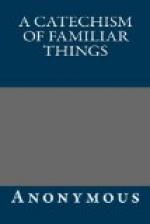Codes, books
or writings setting forth certain laws or
rules respecting particular
subjects; books of civil laws.
Are Navigation and Commerce inseparably connected with each other?
It may be considered as a general maxim, that their union is so intimate, that the fall of one inevitably draws after it that of the other; and that they will always either flourish or decline together may be seen, by examining the reason of their passing successively from the Venetians, Genoese, &c., to the Portuguese and Spaniards, and from them to the English, Dutch, &c.
Maxim, rule, an established principle.
Intimate, close.
Inevitably, without possibility of escape, unavoidably.
CHAPTER XVIII.
MUSIC, PAINTING, POETRY, ASTRONOMY, ARTS AND SCIENCES, ART OF WRITING, AND CHEMISTRY.
What are the earliest accounts of Musical Instruments on record?
The earliest accounts of music which we possess are to be found in the Bible, in which the state of the world before the flood is noticed. Jubal is said to have been “the father of them that play upon the harp and organ;” but it is not to be supposed that these instruments at all resembled the harp and organ of modern times. Musical instruments, in the times of David and Solomon, were used in religious services; and music was certainly employed by the Jews on many other occasions, as at funerals and weddings, at harvest home, and at festivals of all kinds.
Modern, opposed
to ancient, pertaining to the present
time, or time not long
past.
Festival, a rejoicing,
a feast, a season dedicated to
mirth.
What nation was particularly celebrated for musical talents?
The ancient Egyptians; who were so celebrated for their talents in music, that the distinguished philosophers of Greece braved many dangers, in order to study the science in Egypt; and this, at a period when the Egyptians were far from being in the same high state of civilization as their forefathers had been in earlier times. The history and monuments of ancient Egypt have many accounts and representations of musical instruments, and remains of these have lately been discovered, so that we have ocular demonstration both of their existence and form.
Civilization,
freedom from barbarity, polish, politeness,
possession of knowledge
and the arts of life.
Ocular, known or seen by the eye.
Demonstration, the act of proving with certainty.
In how many divisions may musical instruments be arranged?
There are three kinds, namely, wind instruments, as the trumpet, and the organ;—stringed instruments, as the harp or lyre, violin, &c.; and instruments of concussion, in which the sound is produced by striking a sonorous body, as for instance the drum, bells, &c.




